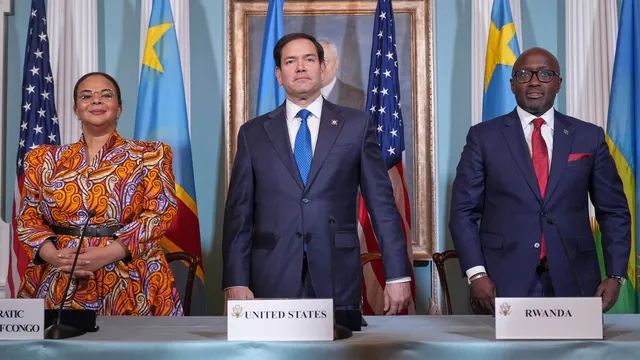
Congo and Rwanda sign peace agreement to resolve long-standing conflict
2025-06-21 14:48- Representatives from Congo and Rwanda signed a peace agreement aimed at ending decades-long conflict over mineral resources in eastern Congo.
- The agreement includes provisions for disarmament and respect for each country’s territorial integrity.
- Successful implementation of the agreement could lead to significant foreign investment and economic development in the region.
Express your sentiment!
Insights
The Democratic Republic of Congo and Rwanda recently signed a peace agreement in Washington, aiming to resolve a conflict that has lasted for decades, primarily fueled by battles over mineral wealth in eastern Congo. This agreement was facilitated by the U.S. and Qatar after years of failed talks and ongoing violence, including significant displacement and humanitarian crises affecting millions of people. Key provisions of the agreement focus on respecting territorial integrity, disarming non-state armed groups, and establishing mechanisms for security cooperation between the two nations. Furthermore, the agreement includes plans for ongoing dialogue and ministerial-level meetings to address further issues. The relationship between Congo and Rwanda has been strained for years due to accusations from Congo that Rwanda supports the M23 rebel group, which is blamed for much of the unrest in the region. The M23 has gained significant ground, capturing strategic areas like Goma. This situation has led to catastrophic humanitarian crises, with more than 7 million displaced and extensive loss of life attributed to ongoing conflicts over control of valuable mineral resources. The agreement seeks to bring an end to this violence and restart economic development through potential foreign investments in Congo's mineral-rich territory. In addition to the agreement’s immediate implications for peace, it also carries several long-term prospects. For Congo, the hope is that a stable environment will attract foreign investments essential for capitalizing on its vast mineral deposits, which include gold, cobalt, and lithium, critical for modern technologies. On the other side, Rwanda's involvement in supporting certain rebel factions raises concerns about its ongoing influence in Congolese affairs, suggesting that both countries must make significant efforts to align their interests for lasting peace. The announcement of this peace deal is particularly significant following several previous unsuccessful negotiations, showcasing the regional and international interest in stabilizing Central Africa. In a statement, U.S. Secretary of State Marco Rubio emphasized the need for commitment from both parties to uphold the agreement, recognizing that meaningful change requires follow-through on the terms established in Washington. The international community is watching closely to see if this new agreement can stand where others have failed, as the stakes are exceedingly high for the millions affected by the ongoing strife.
Contexts
The history of the Congo-Rwanda conflict is rooted in a complex interplay of ethnic, political, and social dynamics that have played out over several decades. The region's troubled past can be traced back to colonial interventions and the imposition of arbitrary borders, which exacerbated ethnic divisions, primarily between the Tutsi and Hutu populations. In Rwanda, the colonial administration favored the Tutsi minority, leading to resentment among the Hutu majority. This tension exploded into violence during the Rwandan Civil War from 1990 to 1994, culminating in the horrific genocide against the Tutsi, where an estimated 800,000 people were killed in less than 100 days. In the wake of this tragedy, millions of Rwandans, mostly Hutu, fled into neighboring countries, including the Democratic Republic of the Congo (DRC), where they further destabilized the region. Following the genocide, a significant Rwandan military presence emerged in eastern DRC, officially to pursue Hutu extremists responsible for the massacre. However, this intervention escalated into a broader conflict as various armed groups, including the Rwandan Patriotic Army and local militias, vied for control over the mineral-rich territory of the DRC. The Congo Wars, comprising two major conflicts from 1996 to 2003, drew in multiple African nations and resulted in millions of deaths, primarily due to violence, disease, and starvation. The intertwining of ethnic tensions and economic motivations has highlighted the role of natural resources in fueling the conflict, as minerals such as coltan and diamonds have become focal points for exploitation and violence. The persistence of conflict in the region can be attributed to weak governance in the DRC, ongoing rivalries among various armed groups, and the lack of effective international intervention. Despite the official end of the wars, armed conflicts continue in eastern DRC, exacerbated by grievances over land, political representation, and exploitation of resources. The situation remains precarious as local communities continue to suffer from human rights abuses, and the cycle of violence appears unending. Recent regional agreements have sought to address the root causes of conflict, but implementation has often been hampered by lack of trust among parties, inadequate enforcement mechanisms, and the pervasive influence of foreign actors. As of 2025, the international community continues to grapple with the ramifications of the Congo-Rwanda conflict. Efforts to promote peace and reconciliation vary in effectiveness, largely due to the deeply ingrained mistrust between ethnic groups and governments in the region. The African Union and various NGOs work to mediate dialogue and foster cooperation, yet progress remains slow. The challenges of demobilizing armed groups and promoting socio-economic development are paramount in rebuilding a stable environment. Furthermore, the ongoing need for transparency in resource management and the protection of civil rights are essential steps towards ensuring lasting peace and mitigating future conflicts.